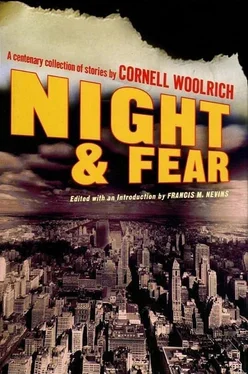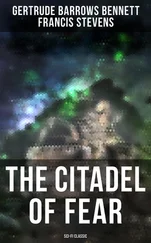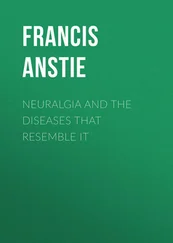He had to feel the links with the tips of his fingers, hardly able to see them. The stones were fortunately all hung from one main chain that fastened at the back of the neck. The metal, silver or whatever it was, was soft and the clippers severed it easily.
Even so, it was almost a half hour before he showed up in front of the lighted powerhouse grating once more to give them back. The machinist’s expression showed plainly that he’d been thinking the worst in the meantime.
“What’d you do, try to trade ’em in for a shot of ‘smoke’?” he wanted to know sullenly. “Now don’t come around here no more, understand?”
But Keogh didn’t intend to, if he could help it. All he wanted was a sanctuary, to get in out of the open for a while, where they couldn’t find him. Those denuded links of gleaming metal carefully collected in a scrap of newspaper in his pocket would be a means toward that. The loosened diamonds, wrapped up in another piece of paper, were in his other pocket. Once he got into some kind of a room, he could think of a better hiding place for them.
He went walking up Park Row with almost enough wealth in his shabby coat to have bought the street out, and went into the Federal Bar. Unfortunately the pawnshops weren’t open now, but they knew him there in the Federal. He wasn’t a drinker, but they’d let him sit in the back until closing time more than once on a cold night.
There were only two or three glassy-eyed barflies left at the bar at this hour, but he didn’t want even them for an audience. He went all the way to the end and signaled the barman.
The latter sensed a touch, or an attempt to promote a free drink. “Whaddya want?” he asked without moving.
“I wanna show you something,” Keogh answered in as low a voice as would serve his purpose. Even so, the three barflies, glassy-eyed though they were, turned and gandered down at him to see what it was.
Keogh turned his back to them when the barman had joined him and nervously took the wad of newspaper out of his pocket. He was under a strain, trying too hard not to let the barflies see, and worrying too much about whether the barman would let him have fifty cents on what he was going to show him. Without realizing what he was doing he had opened the wrong package! The barman, snapping from professional boredom to electrified incredulity, had a glimpse of fifteen or more loosely pressed diamonds in the hollow of the newspaper before Keogh quickly bunched it up again.
The barman’s eyes were like half moons. “Wait a minute; what was that again? Lemme see, don’t be in such a hurry!”
But Keogh, his face pale at the ghastly blunder, had already crammed them back in his pocket. He didn’t attempt to take the other package out now. The least spiffed of the barflies took a tentative step up toward him, to see what had made the bartender goggle so.
Keogh backed away toward the door. “Look real, don’t they?” he stammered. “Just glass — found ’em in an ash can just now. Well, so long!”
“Lemme have a closer look. I can tell you if they’re glass or not,” the barman said craftily. Then as Keogh turned and bolted out he called after him futilely, “C’mon, have a drink on the house! What’s your rush?” Trying to get him cockeyed and kill him if the stones turned out to be real!
Keogh hurried away from the place, cursing himself. Now he had to get off the streets in a hurry. He hadn’t kidded that barman any. Unlike pearls, it wasn’t very hard to tell real diamonds from glass, even at a brief glance. The fellow would talk his head off within the next few hours to any one that came into the place. And the wrong guy might just happen to come in!
Keogh plunged into the next dive, a block up, the Silver Flash. He was known in there, too. The place was empty under the pair of dismal, icy-white reflectors that gave it its name. This time he didn’t make any mistake in opening the right package, but his hands were shaking so he could hardly unfold the paper. A man could have all the wealth of Golconda on him and still remain as broke and homeless as ever, he was finding out.
The new barman studied the links and remained unimpressed. “What good are these to me?” he asked. And then, inevitably, “Where’d you get ’em?”
“A guy gave ’em to me,” Keogh improvised. “Lemme have fifty cents on ’em just until morning. They’re silver,” he added desperately.
“How do I know they’re silver? I ain’t in the loan business, anyway.” The barman handed the outspread paper back.
The owner had come out from the back while they were talking. He picked up one of the pieces now and looked at it, with a sort of remote professional interest, as though he had once been a jeweler himself or a jeweler’s assistant. Then he looked more closely, taking the whole paperful under the light to study them better.
When he came back he said to the bartender, with crafty casualness, “Naw, it’s not silver, but give him fifty cents anyway, Joe.” They exchanged a look, and the bartender punched the register. The owner had just seen 14K stamped on the back of one of the links and knew it was white gold.
Keogh, outside with money in his hand, took a deep breath. Now at last sanctuary was within reach! And none too soon. He was giving them — by them he meant the gang involved in the original theft, for, of course, there were more of them implicated than just that one tough who had held him up outside the cafeteria — credit for sense enough to know where to come looking for him.
He hadn’t had a cent on him, so the Bowery was the logical place to search for him. But now he could get in out of the open, until morning at least, so let them look! For thirty-five cents he could get a room all to himself.
He went into the nearest lighted doorway that had a sign, “Rooms for Men,” over it and got one. He wasn’t shown up, just handed a key and told where to find it. He climbed the stairs, the pounding of his heart slowly quieting. The lights were out in the second-floor “reading room,” with its long bare tables and benches, like a meeting house, and its two or three newspapers that passed from hand to hand through the dragging, hopeless hours of the day and evening. But he stepped in and found one of the papers, taking it up to his room to see if he could find any mention of the necklace in it.
The story would have been hard to miss. It was right on the front page — “Daring Jewel Robbery in Broad Daylight.” At nine yesterday, the day that had ended a few hours ago at midnight, a rich dame had been held up in her West End Avenue apartment, and she and her maid had been tied up and stacked in a closet.
But the details didn’t interest him as much as the words — “a diamond necklace valued at $25,000.” That was it, sure! But he nearly fell over at sight of the figures staring him in the face like that, in cold print.
Keogh suddenly got all weak and wobbly, his hands became cold and his knees started to shake. He’d thought vaguely until now in terms of a thousand or two dollars, but the realization that he’d been carrying around twenty-five thousand dollars’ worth of diamonds half the night nearly paralyzed him with terror. For long minutes he just sat there on the edge of the crummy bed, panting and perspiring.
All his carefully built-up reasons for not turning the find over to the police collapsed. Let them implicate him. Anything was better than this suspense! The longer he held onto the jewels, the deeper they’d implicate him, anyway. He should have gone right to the nearest station house with them when he’d found them. Now he’d broken the necklace up and sold the settings. But maybe they wouldn’t be too hard on him as long as he gave the stones themselves back.
Читать дальше












